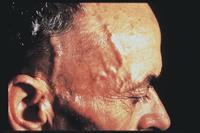Giant Cell Arteritis
In an older adult, a new, persisting headache—especially if together with flu-like symptoms, unexplained fatigue (tiredness) or fevers—can be due to an illness called giant cell arteritis or GCA. A disease of blood vessels, GCA can occur together with polymyalgia rheumatica (also called PMR).

FAST FACTS
GCA generally occurs in older adults, usually those over the age of 60.
If GCA affects blood flow to the eye, loss of vision can occur.
Loss of vision can be prevented by prompt diagnosis and treatment.
WHAT IS GIANT CELL ARTERITIS?
GCA is a type of vasculitis or arteritis, a group of diseases whose main feature is inflammation of blood vessels. In GCA, the vessels most often involved are the arteries of the scalp and head, especially the arteries over the temples, which is why another term for GCA is "temporal arteritis."
GCA can overlap with PMR. At some point, 5%-15% of patients with PMR will have a diagnosis of GCA. Looked at another way, about 50% of patients with GCA have symptoms of PMR. The two conditions may occur at the same time or on their own.
The most common symptom (what you feel) of GCA is a new headache, usually around the temples, but headache due to GCA can occur anywhere, including the front, top and back of the skull. Almost as common are more widespread symptoms, such as fatigue, loss of appetite, weight loss or a flu-like feeling. There may be pain in the jaw with chewing. Sometimes the only sign of GCA is unexplained fever. Less common symptoms include pains in the face, tongue or throat.
If GCA spreads to the blood supply of the eye, eyesight can be affected. Problems with vision can include temporary blurring, double vision or blindness. Permanent loss of vision in GCA can occur suddenly, but proper treatment can prevent this complication. In fact, if vision is intact at the time the patient starts treatment, the risk of later loss of sight is 1 in 100 or less.
It is vital that patients who have PMR, either active or inactive, report any symptoms of new headache, changes in vision or jaw pain right away to their doctors.
WHAT CAUSES GIANT CELL ARTERITIS?
As with PMR, the cause of GCA is not known.
WHO GETS GIANT CELL ARTERITIS?
GCA affects the same types of patients as does PMR. It occurs only in adults usually over age 50, in women more than men, and in whites more than nonwhites.
HOW IS GIANT CELL ARTERITIS DIAGNOSED?
There is no simple blood test or noninvasive way to confirm the diagnosis of GCA. The erythrocyte sedimentation rate, or "sed rate," a blood test that measures inflammation, is high in most people with GCA. But because other diseases can cause high sedimentation rates, doctors cannot rely on this finding as proof of GCA.
It is common to do a biopsy—or surgical removal —of a small piece of the temporal artery and study it under a microscope for signs of inflammation. In GCA, the biopsy shows inflammation of the artery. If there is doubt about the diagnosis based on the first biopsy, your doctor may do a biopsy of the temporal artery on the other side of your head.
HOW IS GIANT CELL ARTERITIS TREATED?
The treatment for GCA should begin as soon as possible because of the risk of loss of vision. If your doctor strongly suspects GCA, treatment can start before you get the results of a temporal artery biopsy.
Unlike the treatment for PMR, which requires only low-dose corticosteroids (also called glucocorticoids), GCA treatment usually involves high doses of corticosteroids. Headaches and other symptoms quickly decrease with treatment, and the sedimentation rate declines to a normal range.
Source: http://www.rheumatology.org/Practice/Clinical/Patients/Diseases_And_Conditions/Giant_Cell_Arteritis

